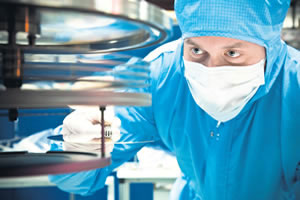| Posted: December 11, 2008 |
Three Finnish companies are on the forefront of nanotechnology |
|
(Nanowerk News) One of the most exciting industries that could dramatically change our lives in the future is nanotechnology, or technology on the atomic or molecular scale. Finland has long been supportive of new technologies, and one way it encourages young nanotechnology companies is the new nanosurface@otaniemi microclustering program.
|
|
"Picosun has been part of nanosurface@otaniemi from the very beginning," says Pekka Reinikainen, Communications Director of the nanotech company. "We are an integral part of all activities of the Finnish nanocluster and find this cooperation extremely useful. The support that we get from projects like nanosurface@otaniemi is of utmost importance for our work both today and in the future."
|
 |
| In order to create a one nanometre (nm) thick film on the wafer in this picture, you need to deposit 100 Atomic Layer Deposition (ALD) pulses with a Picosun SUNALE™ R-series ALD reactor.
|
|
The program aims to support the commercial utilisation of nanosurface-related know-how. The aim of the microclustering projects of Otaniemi Marketing in general is to create lively technological ecosystems that generate world class research and innovations, build start-ups into fast growing high-tech companies and to attract investments and global technology actors to Otaniemi. The nanosurface@otaniemi program is hosted in cooperation with Culminatum. Below we profile three of the most promising companies in the nanotechnology industry.
|
|
Thin films
|
|
One of the oldest nanotechnologies is Atomic Layer Deposition (ALD), which is a method to deposit thin films of a material. This method allows excellent film uniformity, even upon three-dimensional objects on the nano-scale. ALD was invented in 1974 by Dr Tuomo Suntola, who is on the Board of Directors of Picosun, a leading manufacturer of ALD reactors.
|
|
Reinikainen names a few examples of the applications of ALD. "Superconductors, coatings against corrosion, electrical conductors and light-emitting materials," he explains. "In the future the fruits of the work of Picosun will be found in the most surprising places. Picosun’s input into the consumer interface with nanotechnology will be invisible but important. In a decade or so, an average person will – unbeknownst to her – bump into one or the other small yarn of Picosun’s footprint here and there."
|
|
Picosun has clients among universities, business research labs and companies using ALD for production purposes. It has 20 employees and has seen no slowdown in business. "We currently have a full dozen ALD reactors on our assembly line, and interest from both production and research clients worldwide has, if anything, increased," reports Reinikainen.
|
|
Carbon footballs
|
|
Canatu produces thin film electrical and optical components based on a new class of versatile carbon-based nanomaterial. The company essentially combines two forms of nanometre-sized carbon. One form is shaped like a football and the other is shaped as a tube. The football-shaped carbon has unique chemical properties but is difficult to use in applications. Conversely, the tube-shaped carbon is largely chemically nonreactive but has many applications.
|
|
"Canatu has overcome this deficiency by inventing a new hybrid material, featured last year in Nature Nanomaterials, in which they are joined," says David Brown, CEO of Canatu. "This new molecule combines the best properties of both! It has amazing mechanical, chemical, thermal and electrical properties but also has new properties that neither alone possesses."
|
|
These new nanomaterials could revolutionise a wide range of new products. Brown ticks them off: "Flexible and durable solar cells, transparent electronics, more life-like displays, faster telecommunications, more compact and light batteries, more precise lasers for surgery or manufacturing, and even super-thin speakers."
|
|
Superhard nanomaterials
|
|
Carbodeon and its parent company Picodeon provide a unique coating technology as well as superhard materials. Picodeon uses patented laser technology to deposit virtually any type of material onto any type of material. Carbodeon supplies products for applications that demand extremely hard materials.
|
|
"Picodeon’s coating applications include functional smart coatings, optical structures, anti-corrosive films, thermally or electrically insulating layers and stain repellent layers," explains Asko Vehanen, CEO of Picodeon. "One application is solar energy. We are jointly developing new photovoltaic low-cost large area solar energy solutions with Scatec, a major Norwegian developer."
|
|
Vehanen says that his company’s products can impact the average person in a number of different fields such as energy production and sustainable environmentally friendly products. They now hold over 150 patents or patent applications in such diverse industries as solar cells, construction, automotive and health care.
|

